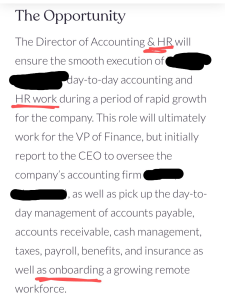Why do so many organizations completely miss the mark when it comes to job titles?
I haven’t been able to get this question out of my head after seeing a recent conversation on Twitter.
 A friend had shared a job posting for a Director of Accounting and…HR. OK, yes, the ellipsis was my addition for emphasis, which tells you exactly how this posting landed in the eyes of those who have worked in HR. Or in accounting, for that matter.
A friend had shared a job posting for a Director of Accounting and…HR. OK, yes, the ellipsis was my addition for emphasis, which tells you exactly how this posting landed in the eyes of those who have worked in HR. Or in accounting, for that matter.
There was some back and forth about how it’s not uncommon for smaller companies to put payroll and HR in the same bucket, which we all acknowledged. But the posting clearly focuses on the accounting side of the equation, with HR (which is apparently just benefits, insurance, and onboarding) being an afterthought.
Putting aside the problematic nature of the way the job post just assumes anyone in accounting can navigate HR for a rapidly growing company, we need to talk about the recruiting nightmare this job post creates.
In my entire career, I have never met an accountant who wanted to take on HR responsibilities. And most people in HR do their best to avoid getting in the weeds of accounting. Yet here is a posting that assumes director-level experience in both disciplines. I weep for the recruiter who has to source and hire for this role, because they are in a nearly impossible position. And I weep for the candidate who may want the accounting job or the HR job…but certainly not both.
Organizations just can’t seem to get out of their own way, making one bad decision after another, resulting in a frustrating experience for everyone. Whether it’s lack of knowledge or simply not caring, companies will fall into the same common traps: They over-inflate job titles (no, your entry-level sales rep is not an “Account Director”). They under-title roles to avoid paying people what they’re worth (that person who manages a $200M annual budget and oversees an entire department may be more than a supervisor). They post positions using ridiculous technical internal titles, or they vague-post jobs to hide the level, and compensation, of a position. Every bad decision sabotages the hiring process.
If you’re in any position to influence the way titles are used in your organization, please fix this. Here are few ideas to get you started:
- Audit your job levels early and often. When is the last time you really took a look at the work people were doing in your organization? Do the job titles and descriptions accurately reflect that work? Do the salary bands further support the expertise required? If your answer to any of these questions is, “I don’t know,” then do an audit. Right now. Then schedule a regular audit. And put into place a process in which people can request an off-cycle role review. You owe it to your employees and your candidates to ensure the job is at the right level and the right pay.
- Embrace universal titles. Yes, I know your company probably has career paths that are specific to your industry and make sense to you. But the average candidate doesn’t have the slightest idea what a “Documentation Specialist II” is (it’s an instructional designer, apparently). Post the job the way a person would look for it. Save the internal titles for internal needs.
- Don’t get cute. Thankfully, we’ve mostly left the days of “HR Guru” and “Coding Ninja” behind, but goodness knows such titles are still out there. There are better ways to convey your laid-back company culture than by demeaning a recruiter by forcing them to describe exactly what a “Dream Maker” does.
- Look beyond the candidate’s past titles. Remember that not all organizations are as enlightened as yours. Someone who has a director title may be far less qualified than the person with a manager title. Hell, someone may have worked at Zappos and is now trying to find a job after not even having a title for the last five years. Look at responsibilities, skill sets, education, anything and everything that will help you find the best person for the job. Title bias is a real thing — don’t fall for it.
The key concept I hope you take away from this article is that as much as we want to claim titles don’t matter, they totally matter.
Recruiters, candidates, employees, everyone looks to titles as a measure of where they fall in an organization, what their responsibilities are, and what their salary should be. Until the world finally acknowledges that “jobs” are no longer a real thing and we all simply evolve our skills to meet the needs of the most recent project, job titles are the first indicator of the work being done, and the person doing that work. Don’t forget that.
